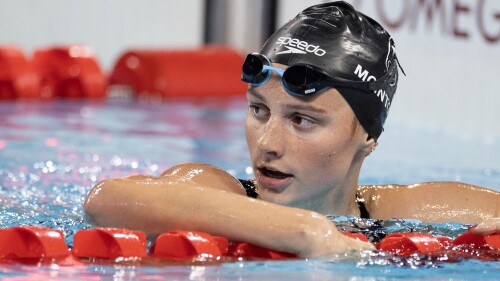Kirsty Coventry can remember the spot in her living room 33 years ago when, shortly after getting out of the pool and still wearing her swimsuit, she watched TV coverage of the Barcelona Olympics and a diver competing for her country of Zimbabwe.
“I knew as a 9-year-old that I wanted to go to Olympic Games and win a gold medal,” she said.
Now, at age 41, the seven-time Olympic medalist Coventry is the first female IOC president, the first IOC president from an African nation and the youngest person in the role in a century.
“It’s not just about a multisport event,” she said Monday in a handover ceremony with outgoing IOC President Thomas Bach. “It’s a platform to inspire. It’s a platform to change lives, and it’s a platform to bring hope.”
Coventry, elected to the role in March, formally took office on the annual Olympic Day.
“Today is a day of joy, the joy of passing the torch to a new generation,” Bach, elected IOC Honorary President for Life, said at the IOC base of Lausanne, Switzerland.
Coventry was banned from family card games growing up. “Because I hated to lose,” she said. She loved swimming so much that she slept in her suit. She was bullied and called names by classmates for saying she would one day win Olympic gold.
“Those same people, when I won my medal and I went back to Zimbabwe, were the first people that wanted a picture with me,” she said.
Coventry swam at four Olympics — 2000 through 2016 — and realized her dream from age 9, taking back-to-back 200m backstroke golds in 2004 and 2008.
In addition to watching the Barcelona Games, Coventry has vivid memories of her first Olympics in Sydney at age 17.
Like when she fell over while struggling to squeeze into a new racing suit. The swimmer next to her offered to help. Coventry looked up and saw her hero, gold medalist Susie O’Neill of Australia.
Or when she marched onto the Sydney Aquatic Centre pool deck for her first preliminary heat and felt “14,000 people all screaming and shouting for swimmers that they didn’t even know.”
Coventry didn’t make any finals in Sydney, but followed it with a deluge: titles at the Commonwealth Games, the NCAA Championships (with Auburn) and the World Championships, in addition to her world records and Olympic medals.
She went into the 2008 Beijing Olympics with a goal to win four individual golds. She took silver in her first three events, then capped it with that 200m back repeat victory.
“It was not the most enjoyable from my perspective,” she said, “because I had pinned everything to it being successful, and it was only going to be success if it equated to four gold medals.
“I wish I had gone back and realized what I was actually achieving in the moment.”
In 2016, the year of her final Olympics, Coventry confided in her longtime coach, Kim Brackin, that she wanted to be IOC president one day.
By then, Coventry was already an IOC member on the athletes’ commission.
“She has always known what she is capable of,” Brackin said minutes after Coventry was elected IOC president.
Kirsty Coventry thanks her family and friends for always keeping her grounded and humble, and expresses gratitude to the strong women in her life. pic.twitter.com/c0v50weE48
— IOC MEDIA (@iocmedia) June 23, 2025
Coventry detailed her vision for an IOC presidency — one of if not the most powerful in global sport — in her candidate manifesto published last December (soon after she gave birth to her second daughter, Lily).
She wrote that she was guided by the collaborative Ubuntu philosophy: I am because we are.
“Whatever decision I make affects you,” she said last week. “Every decision we make is going to have a ripple effect throughout our ecosystem.”
That in mind, Coventry already invited IOC members to what she called a “pause and reflect workshop” this Tuesday and Wednesday. It’s the first step toward a longer consultation process with broader stakeholders to strengthen the Olympic Movement in a collective way.
“As I’ve got a little bit older, you also realize that while you like to win everything, sometimes there’s a little bit more benefit in the collaboration and working together,” she said, “so that everyone wins, and it’s not just an individual act.”

